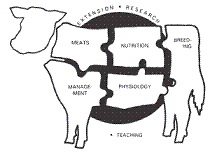Animal Science, Department of

Nebraska Beef Cattle Reports
Date of this Version
2018
Citation
2018 Nebraska Beef Cattle Report. University of Nebraska Extension MP105. Lincoln, NE.
Abstract
This study was conducted to evaluate the relationships between animal oxidative status (as indicated by superoxide dismutase [SOD] activity) to marbling and beef tenderness. Prime and Select-grade strip loins were selected and aged for 2, 7, 14, 21, and 28 days for Warner Bratzler shear force, Troponin-T, and SOD activity. Results showed that meat exhibiting higher levels of marbling had lower shear force values and thus were more tender. Low-marbled samples tended to have a greater tenderness response to aging. The effect of oxidative stress, however, was not evident in this study as SOD values were similar. Although the effects of oxidative stress on beef tenderness are still unclear, results from this study provide a conceptual foundation for a new research perspective on meat tenderness.
Included in
Large or Food Animal and Equine Medicine Commons, Meat Science Commons, Veterinary Preventive Medicine, Epidemiology, and Public Health Commons


Comments
© 2017 The Board Regents of the University of Nebraska.